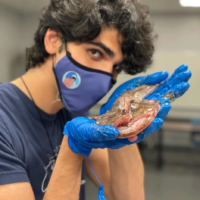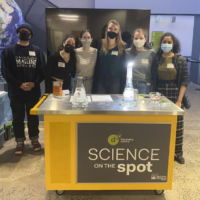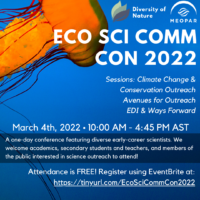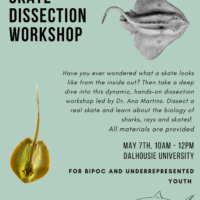This post is written by the Diversity of Nature team.
This past year, we at Diversity of Nature (DoN) were honoured to be supported by the Marine Environmental Observation Prediction and Response Network (MEOPAR) through their Training Fund. With MEOPAR’s help, we were able to achieve our mission of both scientific inreach and outreach within our communities, spreading our love for ecology and our message about diversity, equity, and inclusion in ecology.
“Inreach”: Working with other scientists to build capacity for science communication
We kicked off Fall 2021 by participating in MEOPAR’s Annual Training Meeting (ATM), where the directors of DoN gave a plenary talk on how to translate marine science into effective scientific outreach. We had the pleasure of working with numerous other scientists who shared their thoughts on outreach and the best ways to do it (for those of you interested in a brief overview, we have a reference document linked here!). The ATM was a wonderful space for networking and meeting like-minded scientists with a passion for marine biology.
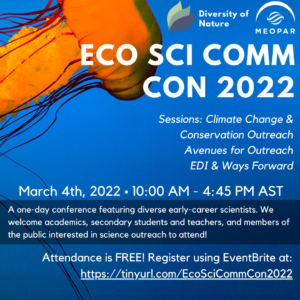
Poster for EcoSciComm Con 2022
Later on in Spring 2022, we worked with an amazing group of diverse and early-career scientists to create the inaugural 2022 Ecological Science Communication Conference (EcoSciCommCon). Ecologists from around the globe came together to share their ideas about how to effectively communicate conservation science, how to better include our communities and diverse peers in science, and many more exciting topics, linked here!
Along the way, we’ve also published several papers about how to make science more accessible for underrepresented groups. These include additions to PLoS Computational Biology’s “10 Simple Rules” series — one for educators and one for students themselves. With contributions from underrepresented scientists from around the world, these pieces were meant to both empower underrepresented students to succeed in the sciences and share equitable pedagogy with educators seeking to support those students.
“Give a student an outreach opportunity, and they’ll communicate science for a day; teach them to do outreach, and they’ll communicate science for a lifetime!”
And last, we worked with an inspiring group of Dalhousie post-docs, graduate students, and undergraduates for our Scientific Outreach and Communication Module. In this class, we taught students the basics of scientific outreach and worked with them to create their own incredible outreach activities with local and international communities. In this class, our students were able to take charge of their own outreach goals and create successful events for the public. Read more about them below!
“Outreach”: Sharing our love for marine conservation with diverse local communities
Students from our Scientific Outreach and Communication Module kicked off their outreach activities with the “Picture a Shark Scientist” online panel, organized by Dalhousie graduate students Emily Cormier and Nakia Cullain. Emily and Nakia invited a diverse panel of shark scientists from around the world to share their stories and research on sharks, skates, and rays. The public had a blast asking the panel of experts their shark-related questions, and it was refreshing and inspiring to see women and women of colour taking charge in the field!
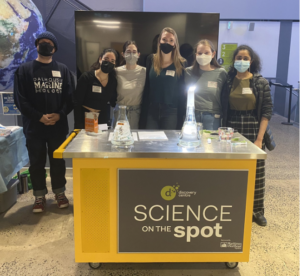
Amy Irvine and Becca Stevens-Green led an incredible all-ages activity at the Discovery Centre. Students were able to learn about photosynthesis, make animal and plant models out of recycled materials, and participate in an educational scavenger hunt!
Dalhousie graduate students Amy Irvine and Rebecca Stevens-Green hosted two “Sea into the Future” events at the Discovery Centre, free of charge to numerous underrepresented youth and family members. Amy and Rebecca taught participants about the impacts of climate change on our ocean and communities, provided hands-on and interactive activities for youth, and also hosted a marine-themed scavenger hunt!
Brazilian graduate student Letitia Magpali created an episode for CetusCast, a podcast about cetaceans (whales, dolphins and porpoises) hosted by herself and another Brazilian colleague. The aim of CetusCast is to inspire and engage Brazilian youth about cetacean science! Brazilian youth who tuned into this podcast, streamed lived on Twitter spaces, were able to learn directly from Brazilian cetacean scientists about how cetaceans communicate, including fascinating examples of the cultural dialects of orcas and sperm whales, and the dolphin-fishermen alliance in Laguna, Brazil, where dolphins and fishermen communicate and cooperate with each other to catch fish!
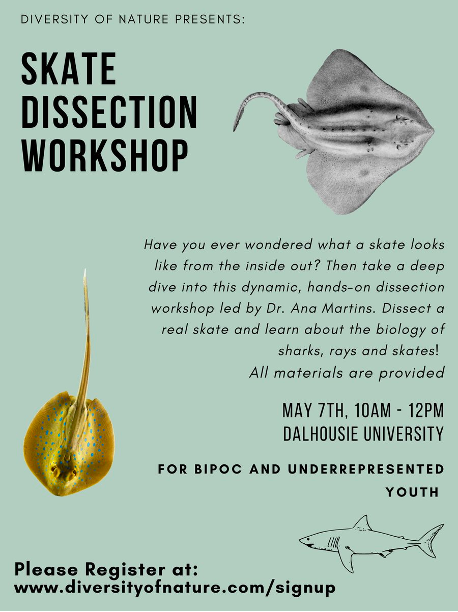
Poster for the Skate Dissection Workshop, led by Dr. Ana Martins. Several BIPOC and underrepresented youth from the community signed up to learn about skate, rays, and shark biology!
Marine scientist and post-doctoral fellow Dr. Ana Martins at Dalhousie University also participated in our Scientific Outreach and Communication Module. She hosted an interactive “Skate Dissection Workshop”, where underrepresented youth were able to dissect a real skate, and learn about the biology of skates, rays, and sharks from marine biologists. She also taught youth about brain dissections and stomach content analysis. Hands-on and immersive activities such as these can have a meaningful impact on participating youth, and we are convinced that at least one skate, ray or shark biologist will emerge from this exciting experience!
Last but not least, undergraduate marine biology student Aaron Judah at Dalhousie University will be leading an ambitious Halifax Shark Week this summer! This week-long event will take place in August and will consist of several panels and hands-on workshops to engage, teach, and inspire youth across Nova Scotia to learn about the importance of shark ecology and conservation. Helping underrepresented undergraduate students lead their own scientific outreach events has been one of the most fulfilling parts of our year.
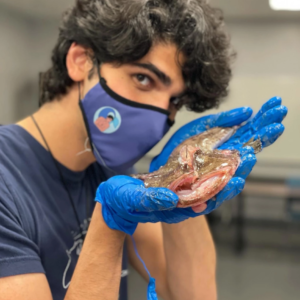
Undergraduate marine biology student Aaron Judah has received several opportunities for science outreach and communication from MEOPAR Training Fund. He was a speaker at EcoSciComCon, where he delivered an awe-inspiring talk on how to create inclusive science outreach to faith-based groups. He also took our Scientific Outreach and Communication Module, and will be leading an ambitious Halifax Shark Week this August!
“A rippling effect for the community”
MEOPAR’s Training Fund has allowed us to work one-on-one with several early-career and diverse marine scientists, who are now equipped with the tools to lead their own scientific outreach events. Opportunities like this certainly have a rippling effect for the community. All participants of our Scientific Outreach and Communication Module have let us know that they plan to continue to lead scientific outreach events for their communities, and we could not be more proud! We are sincerely grateful to MEOPAR’s Training Fund for facilitating this amazing journey!
The Training Workshop Fund has supported Canadian organizations, students, and researchers with up to $20,000 to organize and host training workshops for students, community members, and/or early-career marine researchers. This funding pool is not currently accepting applications.

